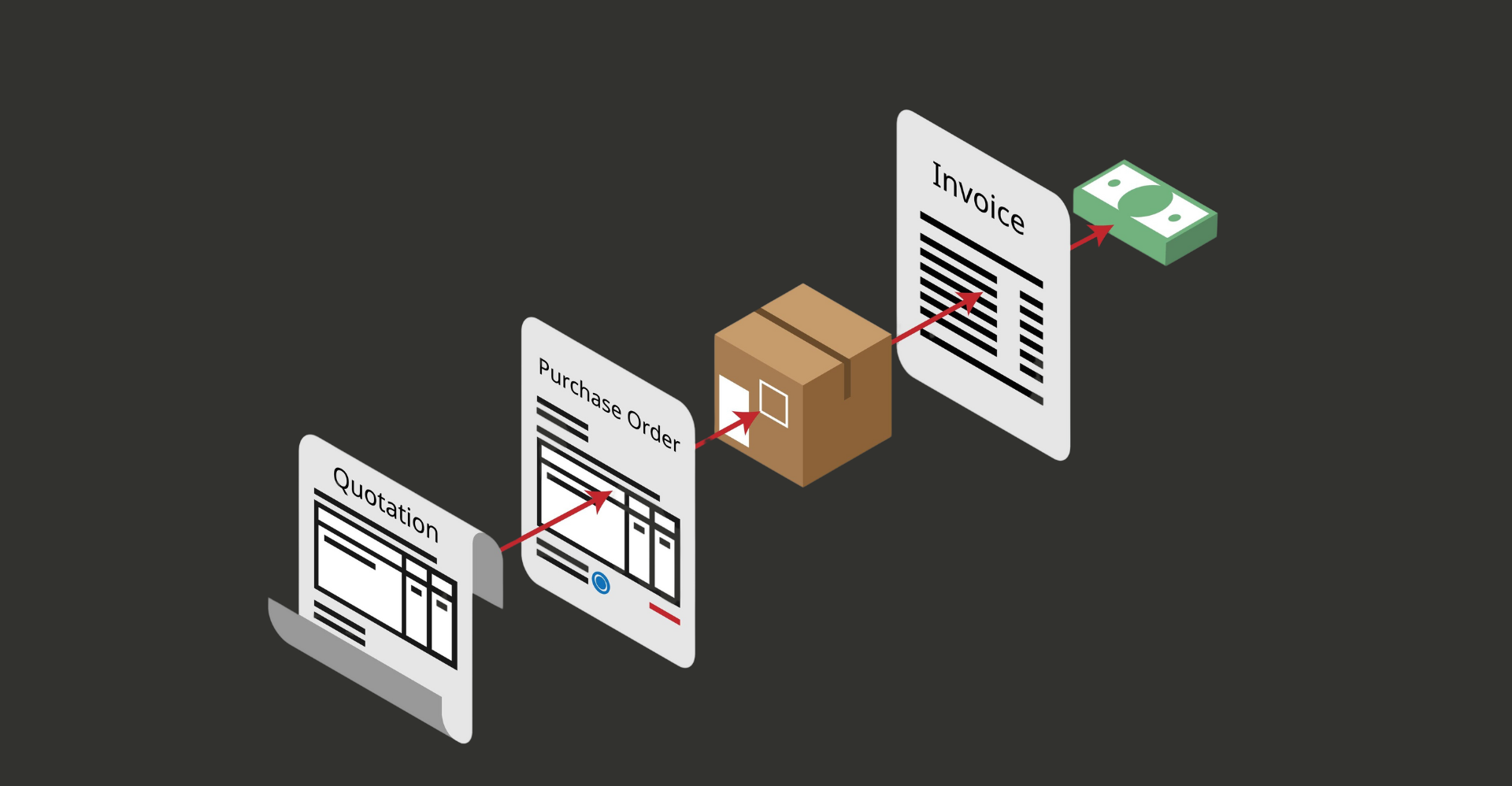For Japanese businesses engaged in international trade, efficient cross-border customs clearance is essential for success in the global marketplace. With Japan's exported commodities reaching a value of around 101 trillion Japanese yen1 in 2023, the importance of streamlined customs processes for businesses operating in this thriving market cannot be overstated.
However, even seasoned logistics exporters can face hurdles when shipping overseas from Japan. With decades of experience in international shipping, DHL Express understands the common issues faced by businesses in Japan when it comes to customs processes, duties, and import & export taxes.
Whether you're a first time exporter wondering how to ship internationally, or an established business seeking solutions to specific customs challenges, this guide will equip you with the knowledge and tools you need to confidently navigate the world of global logistics.
Step 1: Export documentation
Accurate and comprehensive documentation is the foundation of smooth customs clearance. This step outlines the key documents and information needed to ensure your shipments clear customs efficiently.
Accurate goods description
Customs officials rely on these descriptions to classify your products correctly, determine applicable shipping duties and taxes, and ensure compliance with international import regulations.
HS Codes
Harmonized System (HS) Codes are a standardized system of numerical codes used for international shipping to classify traded products. These codes are essential for determining tariffs, duties, and other regulatory requirements.
Using the right HS code from the outset helps avoid delays and improve customs clearance times, avoiding potential delays or unexpected charges when shipping from Japan on your first attempt.
When shipping with DHL Express, you can find the correct HS Code for your products using online resources or by consulting with customs brokers or trade experts.
Clear marking and labeling
Clear and accurate labeling on your packaging is essential for proper identification and handling of your shipment. Customs officials need to be able to quickly and easily identify the contents of your shipment, its origin, and its destination.
Ensure your labeling complies with all international shipping regulations and carrier requirements to avoid unnecessary delays or complications in the customs clearance process.
Step 2: Understanding Incoterms
Incoterms (International Commercial Terms) are a set of standardized trade terms that define the responsibilities of buyers and sellers in international transactions. They clarify who is responsible for shipping costs, insurance, customs clearance, and other logistical aspects of the shipment. Common Incoterms include:
- FOB (Free on Board): The seller is responsible for the goods until they are loaded onto the ship at the port of origin.
- CIF (Cost, Insurance, and Freight): The seller covers the cost of the goods, insurance, and freight to the port of destination.
- EXW (Ex Works): The buyer is responsible for all costs and logistics related to the shipment from the seller's premises.
Here's how Incoterms impact customs clearance:
- Determining responsibility: Incoterms specify who is responsible for handling export and import customs clearance. When shipping with DHL Express, our team of experts can help you understand the Incoterms and ensure your shipments are compliant.
- Managing risk: If goods are held at customs due to incorrect documentation, the Incoterm will determine who bears the costs and responsibility for resolving the issue.
- Cost allocation: Incoterms clarify who is responsible for the costs associated with customs clearance, such as duties, taxes, and customs broker fees.
Choosing the right Incoterm
For exporters, selecting the right Incoterm is crucial for managing risks, controlling costs, and ensuring smooth customs clearance. Here are some key considerations:
- Your level of export expertise: If you have limited experience with export procedures, you may prefer Incoterms like CIF where you handle export clearance but the buyer takes on import responsibilities.
- Available resources: Handling export customs clearance requires time, personnel, and knowledge of regulations. If you have limited resources, opting for Incoterms like FOB, where the buyer handles import clearance, can reduce your burden.
- Your relationship with the buyer: Incoterms that place more responsibility on the buyer, like EXW, may be less attractive to them. Consider collaborating with your buyer to choose an Incoterm that works for both parties.
Step 3: Determining shipment value for customs
Accurately declaring the value of your shipment is a critical step in the customs clearance process. Customs authorities use this value to calculate import duties and taxes, and it can also impact other areas like VAT and the need for specific licenses or permits.
How shipment value impacts customs clearance:
- Calculating duties and taxes: The declared value of your export goods serves as the base for calculating import duties and taxes. Undervaluing your shipment can lead to penalties and your items being held at customs.
- VAT determination: In many countries, the shipment value is used to calculate Value Added Tax (VAT) due on imported goods. Accurate valuation ensures you pay the correct VAT amount and avoid complications.
- Licensing and permits: Some countries impose licensing requirements on goods that exceed a certain value. By accurately valuing your shipments, you can ensure compliance. DHL Express can assist you in identifying any necessary licenses or permits based on your shipment's value.
- DTP (Duties & Taxes Paid) at DHL Express: Selecting this option means the shipper or account holder covers the full cost of the shipment, including duties and taxes incurred at customs. This ensures the recipient receives the package without additional charges upon delivery.
Step 4: Navigating customs and duties
Customs clearance
Customs clearance is a necessary part of international shipping. It involves presenting your shipment and the required documents to customs officials in the destination country. Accurate and complete export documentation is vital to avoid delays, penalties, or even seizure of your goods.
Key aspects of customs clearance:
- Documentation: Ensure all required documents are accurate and complete.
- Inspection: Customs officials may inspect your shipment to verify its contents and compliance with regulations.
- Duty and tax assessment: Customs officials will assess the applicable duties and taxes based on the type of goods, their value, and the country of origin.
- Payment: Duties and taxes must be paid before the goods can be released from customs.
- Release: Once all requirements are met and duties and taxes are paid, your goods will be released for delivery.
Duties and taxes
Duties and taxes can vary significantly depending on several factors, including the specific type of product being shipped, its declared value, and the country of origin. Understanding these costs and thoroughly researching the applicable duties and taxes is crucial for accurate budgeting and customs clearance.
When shipping with DHL Express, customs fees are typically collected at the time of delivery or shortly thereafter, ensuring a streamlined process for receivers. But what happens if you don't pay customs fees? Failure to pay can have serious consequences, including:
- Delays and detention of goods: Your shipment will be held at customs until the fees are paid.
- Storage fees: You may incur storage fees for the period your goods are held at customs.
- Penalties and fines: Customs authorities may impose penalties and fines for non-payment of duties and taxes.
- Legal action: In some cases, legal action may be taken to recover unpaid customs fees.
- Damage to reputation: Non-payment can damage your reputation as a reliable importer and may affect your ability to import goods in the future.
Understanding VAT tax IDs
A VAT tax ID is a unique identification number used by businesses registered for Value Added Tax (VAT). Even when shipping with DHL Express, providing a valid VAT tax ID can be crucial for various reasons:
- Claiming VAT refunds: If you are exporting goods to a country where you are VAT registered, you may be able to claim a refund on the VAT paid on those goods.
- Facilitating customs clearance: In some cases, providing a VAT tax ID may be required for customs clearance.
- Ensuring compliance: Having a VAT tax ID and understanding the VAT regulations in the countries you trade with helps ensure compliance and avoid penalties.
Step 5: Handling customs delays and issues
Common reasons for customs holds
● Incorrect or incomplete documentation: Errors or omissions in your customs documents can lead to delays.
● Valuation disputes: If there are disputes with the valuation of your goods, your shipment may be held for further investigation.
● Prohibited or restricted items: If your shipment contains items that are prohibited or restricted in the destination country, it will be held at customs.
● Security concerns: Customs officials may hold shipments for security reasons, such as if they suspect the goods pose a safety risk.
The following items will NOT be accepted for carriage by DHL. This list includes items which are prohibited for carriage by any law, regulation or statute of any federal, state or local government of any country from, to or through which the items may be carried. For international carriage there may be additional prohibited items specified by the country of destination. DHL may at its sole discretion refuse to carry other items not listed below.
- Bullion (of any precious metal)
- Cannabis
- Cash (legal tender – bank notes, currency notes and coins)
- Complete firearms, ammunition, explosives/explosive devices including inert explosives and test pieces, air guns, replica and imitation firearms
- Human remains or ashes in any form
- Hunting (animal) trophies, animal parts such as ivory and shark’s fin, animal remains or ashes, or animal b y-products and derived products not intended for human consumption, prohibited for movement by the Convention on International Trade in Endangered Species of Wild Fauna and Flora (CITES) and/or local law
- Illegal goods, such as counterfeit goods and narcotics
- Live animals (including but not limited to mammals, reptiles, fish, invertebrates, amphibians, birds, insects, larvae and pupae)
- Loose lithium metal batteries under IATA PI968 section II
- Loose precious and semi-precious stones (cut or un-cut, polished or un-polished)
The following items will NOT be accepted for carriage unless otherwise agreed to by DHL. To obtain such agreement a business case will need to be conducted by DHL and the items approved for carriage will be recorded in writing with the customer.
- Air guns, tasers, imitation or replica firearms, firearm parts and replica ammunition (includes rifle butts, trigger mechanisms, screws/bolts etc which are manufactured for the sole purpose of creating a functional firearm)
- Antiques and works of art with a shipment value in excess of €500,000
- Banderols/Tax stickers with a shipment value in excess of €500,000
- Cigarettes, cigars, tobacco products and electronic cigarettes with a shipment value in excess of €500,000
- Commemorative coins and medals with an individual value or total shipment value of €2,000 or more are restricted for carriage
- Dangerous/hazardous goods including but not limited to perfumes, aftershaves, aerosols, flammable substances, dry ice, biological substances, UN classified dangerous goods and any goods specified as such under International Air Transport Association regulations (“IATA”), the Agreement on Dangerous Goods by Road (“ADR”) or International Maritime Dangerous Goods (“IMDG”) regulations
- Financial and monetary commodities – examples include but are not limited to activated SIM cards for mobile phones, blank or activated credit or cash dispenser cards, blank checks, event tickets, lottery tickets, money or postal orders, pre-paid phone cards, tickets (blank stock), traveler’s checks, vouchers/tokens, unused stamps etc. Applicable to all shipments valued in excess of €500,000
- Furs
- Jewelry and watches and with individual values in excess of €100,000. The shipment must not exceed €100,000
Strategies for resolving customs issues
Resolving customs issues quickly and efficiently requires proactive communication. Contact customs officials promptly to understand the reason for your export item being delayed and provide any necessary information or clarification.
Carefully review your customs documents to identify any errors or omissions, and be prepared to provide additional documentation to support your declared value, origin of goods, or compliance with regulations.
If you are facing complex customs issues, consider utilizing the expertise of a trusted logistics provider like DHL Express, who can offer support and guidance in navigating these challenges.
Remember that resolving customs issues can take time, so remain patient and persistent in your communication with customs officials.
Did you know you can go paperless with DHL?
With DHL's Paperless Trade (PLT) service, you can electronically transmit customs documents. No need to print and fix them to your shipment!
Benefits:
1. Save time and reduce costs for printing and extra resources to attach customs paperwork to your shipment
2. Avoid delays as customs documents can be submitted in a timely manner to facilitate customs clearance
3. Sustainable shipping with less paper and printing supplies
Mastering international shipping and customs clearance
Successfully navigating the complexities of international shipping requires a comprehensive understanding of customs regulations, meticulous documentation, and efficient processes.
By following the steps outlined in this guide, businesses can streamline their export operations, minimize delays, and reduce the risk of unexpected costs or penalties.
Partnering with an experienced logistics provider like DHL Express can further enhance your export capabilities, providing expert guidance, reliable shipping solutions, and dedicated support to help you achieve your international trade goals.
Explore the possibilities and discover how seamless global shipping solutions can propel your global expansion. Sign up for a DHL Express business account today and partner with a worldwide logistics service provider to simplify your international delivery needs.





